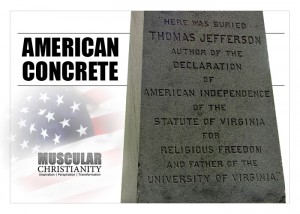
When it comes to the topic of our nation’s Christian heritage, you have two main schools of thought:
- The liberal mindset that insists our forefathers viewed religion as something to be negotiated as an administrative duty
- The Conservative Christian platform that maintains an aggressive acknowledgement and pursuit of God’s Assistance characterized the collective perspective of the founding fathers
Much of the controversy stems from a ruling given by the Supreme Court in 1947 and the way they interpreted a phrase used by Thomas Jefferson in a letter he wrote to the Danbury Baptist Association in Connecticut in 1802. They declared that Jefferson’s usage of the term “the separation of church and state” constituted “the authoritative declaration of the scope and effect” of the First Amendment.1 Since then, that ruling has become the standard by which all public expressions of religious convictions have been measured, leading to an ever increasing limitation being put on the acknowledgement of God in governmental agencies as well as an ever lengthening shadow of doubt being cast on our nation’s religious heritage.
The debate is, at times, passionate and you’ve got buffoons on both sides of the aisle. The venom and the inaccuracies can culminate in a spectacle that can make it difficult to know which argument is correct. But there is a bottom line that transcends the way in which a solitary statement can be potentially dissected to the point where its meaning becomes illusive. That bottom line is to consider, not only the comment that was made, but also:
- the context of that comment
- the character of the person speaking
- the cultural backdrop that made what that person said both relevant and influential
In other words, rather than just scrutinizing what was said, look at also why it was said, to whom was the person speaking and who was it that made the comment. At that point, you’ve got a full color, three dimensional rendering of what was stated as opposed to an intentionally cropped, black and white snapshot.
Using that kind of approach, let’s take a look at Thomas Jefferson and his exchange with the Danbury Baptists.
Jefferson’s Resume

Jefferson’s mental capacity and creativity went beyond mere academics. At the front door of his home, there’s a seven day clock that he designed. It’s counterweights hang on either side of the front entrance and extend through the floor. The height at which the counterweights hang indicate the days of the week that are written on the wall and beneath the floor. Monticello as a whole – the layout of the grounds and the structural design – all served as a testament to the creative intelligence and the intellectual ingenuity of their architect.
In 1962, President John F. Kennedy was speaking at a dinner in the White House honoring all of the living recipients of the Nobel Prize. He said, “I think this is the most extraordinary collection of talent, of human knowledge, that has every been gathered together at the White House, with the possible exception of when Thomas Jefferson dined alone.”2
Thomas Jefferson was extraordinary. Prior to earning his license as a lawyer, he had earned his college degree from the College of William and Mary, having studied Mathematics, Philosophy, Metaphysics as well as French and Greek. It was there that he would also be introduced to the writings of John Locke, Isaac Newton and Francis Bacon – great thinkers that would shape his approach to politics and America’s quest for liberty.
After writing the Declaration of Independence, he returned to Virginia where he served in the Virginia State Legislature, eventually ascending to the position of Governor. His role in crafting the new state government was significant. For nearly three years he assisted in the construction of the state constitution. His most notable contribution was the “Virginia Statute for Religious Freedom” – an accomplishment he had immortalized on his tombstone.
Jefferson was also very familiar with the Bible and the teachings of Christ. During his presidential years, he wrote a 46 page work entitled “The Philosophy of Jesus of Nazareth Extracted from the Account of His Life and Doctrines as Given by Matthew, Mark, Luke and John.”3 Moreover, he understood the necessary role the Christian doctrine played in the formulation of a government based on the Absolutes of Scripture as opposed to the machinations of men, be they manifested in the context of royalty or enlightened reason. While he was convinced that the established clergy of the day were corrupt and the imposition of any one creed by a legislature was fundamentally flawed, it was the transcendent dynamic of the Christian doctrine upon which he founded his philosophical approach to freedom and sound government.
Jefferson’s Starting Point
It’s here where the liberal and conservative perspectives diverge. The liberal platform maintains that Jefferson’s usage of the phrase “separation of church and state” in his letter to the Danbury Baptist Association was intended to purge any mention of God in an official context, be it the Pledge of Allegiance, the display of any Christian symbols during the Holidays , prayer in schools and the list goes on and on. His previously stated comments pertaining to the Christian component of our nation’s government , the culture of the time and the audience he was addressing are all either diluted or dismissed in order to craft a liberal platform that presents America as a purely secular enterprise. Furthermore, there’s a philosophical starting point that Jefferson uses in the two documents he requested be immortalized on his tombstone that gets glossed over as though it has no real bearing on the issue. But if this is the cornerstone of his thought processes pertaining to religious freedom and liberty in general, this is a crucial piece of evidence that needs to be admitted as part of the conversation. Take a look…
In both documents, he bases one’s right to liberty on the fact that God created man to be free.
The Declaration of Independence:
We hold these truths to be self-evident, that all men are created equal, that they are endowed by their Creator with certain unalienable Rights, that among these are Life, Liberty and the pursuit of Happiness…We, therefore, the Representatives of the united States of America, in General Congress, Assembled, appealing to the Supreme Judge of the world for the rectitude of our intentions, do, in the Name, and by Authority of the good People of these Colonies, solemnly publish and declare, That these united Colonies are, and of Right ought to be Free and Independent States…(emphasis added)
The opening statement of Virginia’s Statute for Religious Freedom:
Whereas, Almighty God hath created the mind free;
Jefferson’s sense of reason, in terms of a man’s ability to worship and live as a free entity, was founded on the manner in which God had designed him. In other words, it was the doctrine of the church that gave shape and substance
to the state.
Jefferson’s sense of reason, in terms of a man’s ability to worship and live as a free entity, was founded on the manner in which God had designed him. In other words, it was the doctrine of the church that gave shape and substance to the state. Remove the philosophical foundation of Scripture from Jefferson’s approach to liberty and you reduce the essence of our nation to a complaint rather than an Absolute. Furthermore, by insisting that there be no acknowledgement of the biblical paradigm that supports the ideological structure of our government, we invite the decay and corruption that inevitably accompanies the fallibility of a purely human enterprise.
Jefferson’s faith was unorthodox and his determination to avoid any appearance of officially sanctioning a particular denomination was nothing short of aggressive, but to twist his usage of the phrase “separation of church and state” into a quasi-legislative impetus to remove prayer from schools and strike the “one nation under God” phrase from the pledge of Allegiance, is to ignore the obvious cornerstone of Jefferson’s thought process. In addition, should the liberal perspective be embraced, you make Jefferson himself the “chief of sinners” in that he violates his own supposed conviction by invoking a overtly Christian dynamic in the very documents that define his perspective on the freedoms we enjoy.
Jefferson’s Audience
In addition to considering the background of Thomas Jefferson and his philosophical starting point when it came to the issue of religious liberty, one also needs to look at the society that Jefferson was addressing in the letter he wrote to the Danbury Baptists.
In 1776, the Declaration of Independence, in addition to proclaiming America’s resolve to separate itself from the authority of the crown, it also created a mandate for all states to create their own constitution. While many of the early settlers had left Old World in order to worship according to the dictates of their conscience, not everyone was dissatisfied with the Anglican Church. As a result, while the fabric of America’s religious culture was predominantly Protestant, it was nevertheless interwoven with a number of different denominations. The Church of England was predominant in Virginia, in New England you had a blend of Congregationalists (an evolution of the original Puritans), Presbyterians and Quakers with a small percentage of other denominations scattered throughout the Northeast.
It’s imperative to realize that between 1700 and 1740, an estimated 75-80 percent of the population attended churches which were being built at a headlong pace. When Thomas Jefferson became Vice President in 1797, the Second Great Awakening began and an abundance of revival meetings occurred throughout the country in a sustained pattern that would continue to the Civil War. So common was this anomaly that it was referred to as “the great absorbing theme of American life.”4 And part of what made the evangelical movement so potent was the way in which it was perceived as the best way in which to promote and preserve republican government.
Nineteenth century evangelical literature abounds with statements that could have been inspired by the religion section of Washington’s Farewell Address or copied from the Massachusetts Constitution of 1780: “the religion of the Gospel is the rock on which civil liberty rests”; “civil liberty has ever been in proportion to the prevalence of pure Christianity”; “genuine Religion with all its moral influences, and all its awful sanctions, is the chief, if not the only security we can have, for the preservation of our free institutions”; “the doctrines of Protestant Christianity are the sure, nay, the only bulwark of civil freedom”; “Christianity is the conservator of all that is dear in civil liberty and hu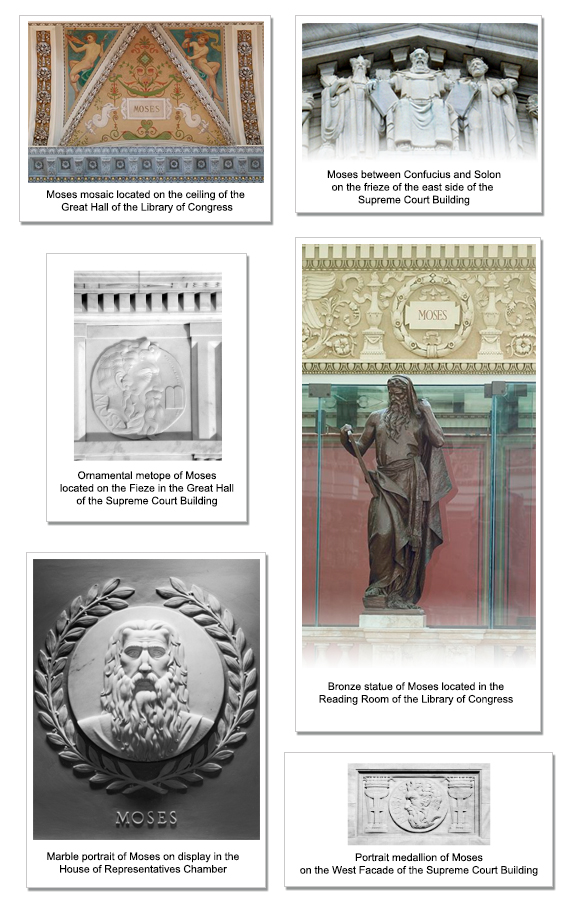 man happiness.”5
man happiness.”5
But while the message of preachers was being embraced as something that promoted the nation’s approach to liberty as well as the key to one’s eternal salvation, it didn’t resolve the tension that existed in many states, as far as the way certain state constitutions made religion – specifically the patronization of a specific denomination – compulsory. In 1724, in the state of Connecticut, if you were a member of the Anglican church, you were required by law to pay a percentage of your income to the local Congregationalist church under penalty of imprisonment or seizure of goods.6 Up until 1818, the Congregational church was the established church of Connecticut which translated to a number of legislative tactics deployed for the expressed purpose of discouraging and harassing members of any “dissenting” denomination.7 In the year 1801, the Baptist churches that comprised the Danbury Baptist Association resolved to approach the newly elected President for the sake of soliciting from him a statement that would reinforce and further promote the idea of disestablishment – the elimination of government-sanctioned discrimination against religious minorities.8
Jefferson’s reply would be reprinted in publications across the nation.9 The effect of Jefferson’s letter is subjective in that it would be several years before Connecticut’s religious tone would be altered to the point where its constitution would be stripped of any legislative power to promote one denomination over another. Other states would follow suit over time, but the bottom lines is that in the early years of the nineteenth century, “religious freedom” wasn’t so much about discouraging public religious expressions as much as it was about eliminating that dynamic where you were legally obligated to attend and support a specific church.
It’s wise to pause for a moment and ponder the mindset of those who were reading Jefferson’s letter in 1802. While our currency today states that we trust in God, statistics reveal a collective disposition that is largely cynical of traditional Christianity.10 In a 2013 article written by Steve McSwain entitled “Why Nobody Wants to Go to Church Anymore,” he cites some compelling stats that proclaim upwards of 80% of Americans are finding “more fulfilling things to do on the weekend” besides going to church.11 That’s not to say that some of these same people aren’t listed on the membership role of a local fellowship, but their commitment to God is casual at best. This is an important dynamic to consider in that, to a nineteenth century citizen of the US, given the religious tenor of the nation as a whole, removing any and all references to Christ from the public arena was not something to be desired let alone considered. Christianity was regarded as both the foundation as well as the fuel for a moral society which, in turn, promoted a healthy republic. Jefferson demonstrated that himself in his personal life as well as his public policies.12 “The Christian religion,” he wrote in 1801, when “brought to the original and simplicity of its benevolent institutor (Jesus Christ), is a religion of all others most friendly to liberty.”13 This is not the sentiment of a man determined to remove faith based gestures from the public arena. And while it wasn’t in Jefferson’s mind to eliminate the concrete of Christianity from America’s foundation, neither was it the ambition of the people he governed or the people who governed alongside him.
Jefferson’s Peers
To state that Jefferson’s was not the only signature on the Declaration of Independence nor was he the only voice that shaped our Constitution (Jefferson was in France when our Constitution was written, but he was nevertheless influential through his correspondence) is to rehearse the obvious. Yet, when you consider the weight given to a single phrase made in a letter that, while politically strategic, had no legislative power, it’s difficult not to feel as though Jefferson’s correspondence with the Danbury Baptists is the only piece of evidence being admitted into the courtroom.
When you consider the other personalities and their respective statements along with their voting record, the resulting dynamic isn’t so much something that isolates Jefferson’s statement to the Danbury Association as unique as much as it brings into focus what he truly intended.
The First Continental Congress and the Constitutional Convention were the legislative bodies that crafted the Declaration of Independence and the United States Constitution respectively. There were 56 signatures on the Declaration of Independence and 55 delegates attended the Constitutional Convention in 1787. With no more than five exceptions, the members of the Constitutional Convention were all orthodox members of an established Christian denomination.14 The signatures on the Declaration of Independence boasts a similar enumeration of men who vocally volunteered their commitment to Christ with little hesitation.
Following the death of Richard Henry Lee (President of the Continental Congress and the man who officially introduced in Congress the call for America’s independence), his papers and correspondence, including numerous original handwritten letters from patriots (e.g.,  George Washington, Benjamin Rush, John Dickinson, etc.), were passed on to his grandson who compiled those documents into a two-volume work published in 1825. After having studied those personal letters, the grandson described the great body of men who founded the nation in these words:
George Washington, Benjamin Rush, John Dickinson, etc.), were passed on to his grandson who compiled those documents into a two-volume work published in 1825. After having studied those personal letters, the grandson described the great body of men who founded the nation in these words:
“The wise and great men of those days were not ashamed publicly to confess the name of our blessed Lord and Savior Jesus Christ! In behalf of the people, as their representatives and rulers, they acknowledged the sublime doctrine of his mediation.”15
The reason the American experiment succeeded is because it was based on the Absolutes in Scripture that pertained to the way in which man was created to think and live as a free enterprise. Political theory and personal preferences can be debated to the point where legislative conclusions are determined more so by charisma and compelling rhetoric than the substance of the truths being considered. Our Founding Fathers knew that and for that reason chose to bring their collective pursuit of liberty beneath the umbrella of Biblical Truth. Within their ranks you had different degrees of orthodoxy as well as a variety of individual perspectives on issues such as slavery and those that were fit for positions of political leadership. But they all believed that man was “…endowed by their Creator with certain unalienable human rights” and it was that consensus that allowed them the opportunity to come together as a unified legislative body and proclaim the freedom of those they represented to King George and to the world.
In Conclusion
Pop Quiz…
Question #1: How often from June 12, 1775 till August 3rd, 1784 did Congress proclaim a National Day of either Fasting or Thanksgiving?
Answer: 18 times. Twice a year – once in March and once in October.16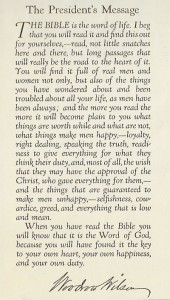
Question #2: The following statement is inscribed on the Liberty Bell: “Proclaim Liberty thro’ all the Land to all the Inhabitants thereof.” What text is that taken from?
Answer: Leviticus 25:10
Question #3: What President attended church services every Sunday during his administration, approved the use of the War Office as well as the Office of the Treasury for religious services and also approved the use of the Marine Band to provide instrumental accompaniment for the religious services going on within those government facilities?
Answer: Thomas Jefferson17
Question #4: Who, more than any other single person, is pictured in various locations throughout Capitol Hill?
Answer: Moses18
Question #5: Above the figure that represents Science in the Library of Congress, there is an inscription. What is that inscription?
Answer: Psalm 19:1 (The Heavens declare the glory of God and the firmament sheweth his handiwork [Psalm 19:1])
Question #6: Who stated the following: “… it is the duty of all nations to acknowledge the providence of Almighty God, to obey His will, to be grateful for His benefits, and humbly to implore His protection and favor.” a) Billy Graham b) George Washington c) George W. Bush d) Charles Spurgeon
Answer: George Washington (proclamation October 3, 1789)
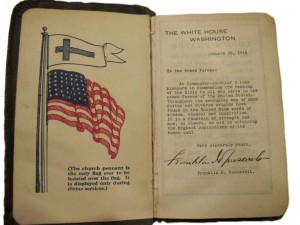 Question #7: It was on April 22, 1864 that Congress resolved to institute the phrase, “In God We Trust” as our national motto. Where did they get that phrase from?
Question #7: It was on April 22, 1864 that Congress resolved to institute the phrase, “In God We Trust” as our national motto. Where did they get that phrase from?
Answer: The third verse of our national anthem19:
Praise the Pow’r that hath made and preserv’d us a nation!
Then conquer we must, when our cause is just,
And this be our motto: “In God is our trust”
The “separation of church and state” phrase can not be accurately utilized as a legal foundation upon which to build legislative mandates to remove Christian symbols from the marketplace. When one pauses long enough to objectively evaluate the whole of Jefferson’s political regard for Christianity, the collective disposition towards religion that belonged to his peer group and the esteem for Christ that characterized the people he governed, to arrive at such a conclusion is nothing less than an irresponsible interpretation of the facts.

“The Light of Truth” painting depicting truth slaying the dragon of ignorance. Four sets of cherubs are featured featuring the four elements of sound law: the square, the plumb, the level and the Bible.
Yet, regardless of substantive the argument may be – that the 1947 interpretation of Jefferson’s phrase was altogether wrong – there are other forces at play that make this debate more than just an intellectual joust.
The fact that no one balked when Washington so vigorously asserted a Christian dynamic in his farewell address or no one objected to Theodore Roosevelt or Woodrow Wilson crafting the preface to the Bibles that were distributed to soldiers being deployed to Europe during WWI is because the religious tenor of nation as a whole was far more healthy.
The Light of Truth is a painting that’s featured on the ceiling of the Members of Congress Reading Room in the Jefferson building which was opened in 1897. The artist, Carl Gutherz, pictures four sets of cherubs to represent four tools that are needed to fashion law that is accurate and sound: the plumb, the square, the level and the Bible. The governmental patrons that commissioned the work of Gutherz were no more concerned about his art constituting a violation of the Establishment Cause then were the members of congress who took the time to read the words of Franklin Delano Roosevelt as they were reprinted on the inside cover of those Bibles that were distributed to servicemen during World War II. Again, America in the 1940’s is revealed as being a nation that was collectively embracing the Truth of God, rather than dismissing it as antiquated and limiting.
The fundamental essence of our corporate perspective on the First Amendment is defined by our national regard for Christ. It’s not a legal discussion only as much as it’s a reflection of who we are spiritually.
If we are to thrive and not just endure as a nation, it’s not a debate that needs to be won as much as it’s a revival that needs to occur. Traditionally, it’s only in times of crisis when our collective knees bow in worship and the indignation of those who want to remove Christian symbols from the marketplace is processed as an obstacle to the common good rather than a catalyst. If we are to enjoy the advantages that go along with being reverent without having to be alerted to our spiritual lethargy by something dramatic, then it’s only common sense to focus on what’s True and labor to influence those on the peripheral in that direction.
Again, it’s not our history that needs to be revisited, it’s our God that needs to be lifted up (Jn 12:32). Only then do our backgrounds and varying convictions blend together in a way that is Truly strong and enduring. Only then does our spiritual heritage come into focus in a way that is not tainted by a worldly desire to distance ourselves from the Author of our freedoms. Only then is our foundation set in the concrete that is truly American as opposed to the shifting sands of cultural whims and academic trends.
1. Religion and the Founding of the American Republic”, Dr. James H. Hutson, Library of Congress, Washington, DC, 1998, p92
2. “John F. Kennedy: Remarks at a Dinner Honoring Nobel Peace Winners of the Western Hemisphere”, The American Presidency Project, http://www.presidency.ucsb.edu/ws/?pid=8623, accessed November 2, 2015
3. “Thomas Jefferson: The Art of Power”, John Meacham, Random House, New York, NY, 2012, p471
4. “Religion and the Founding of the American Republic”, Dr. James H. Hutson, Library of Congress, Washington, DC, 1998, p99
5. Ibid, p109
6. “Connecticut in Transition, 1775-1818”, Richard Joseph Purcell, American Historical Association, 1918, p47
7. Among the laws that the Congregational Church used to make life difficult for dissenters was a “certificate law,” that compelled you to verify your church attendance and the regularity of your tithe via a certificate. Obtaining this certificate could be challenging in that, at one point during the life of this law, the certificate had to be signed by two civil officers or a justice of the peace. Since many of the the civil officers in place were Congregationalists, getting their signature was not accomplished without having to endure a significant amount of harassment and discouragement. For more reading on this subject, refer to “The Connecticut State Constitution”, Wesley W. Horton, Oxford University Press, 2012, p10
8. In an October 7, 1801, letter to then-president Jefferson, the Danbury (Connecticut) Baptists expressed concerns that the Congregationalist-dominated establishment / government in Connecticut might successfully stifle dissenting sects – theirs in particular. The letter carried the Danbury Baptists’ plea for Jefferson’s assistance, or at least the lending of Jefferson’s presidential stature, to thwart establishment-driven, government-sanctioned discrimination against religious minorities. “Freedom of Religion, the First Amendment, and the Supreme Court: How the Court Flunked History”, Pelican Publishing Company, Gretna, Louisiana, 2008, p176
9. “Thomas Jefferson and the Wall of Separation Between Church and State”, New York University Press, NY, 2002, p47 (https://play.google.com/books/reader?printsec=frontcover&output=reader&id=aSg20UE2DHgC&pg=GBS.PT42.w.1.0.45.0.1, accessed Nov 17, 2015)
10. Twenty-eight percent of Americans believe the Bible is the actual word of God and that it should be taken literally. This is somewhat below the 38% to 40% seen in the late 1970s, and near the all-time low of 27% reached in 2001 and 2009. “Gallup”, “Three in Four Still See the Bible as the Word of God”, http://www.gallup.com/poll/170834/three-four-bible-word-god.aspx, accessed November 7, 2015
11. “Huffington Post”, “Why Nobody Wants to Go to Church Anymore”, Steve McSwain, http://www.huffingtonpost.com/steve-mcswain/why-nobody-wants-to-go-to_b_4086016.html, accessed November 7, 2015
12. Jefferson regularly attended church services in the hall of the House of Representatives. In addition, he allowed church services to be held in several federal buildings throughout the capitol on Sundays. Dr. James Hutson, in his book “Religion and the Founding of the American Republic,” states “It is no exaggeration to say that, on Sundays in Washington during Thomas Jefferson’s presidency, the state became the church.” “Religion and the Founding of the American Republic”, Dr. James H. Hutson, Library of Congress, Washington, DC, 1998, p91
13. Ibid, p84
14. “Founding Fathers: Brief Lives of the Framers of the United States Constitution”, M.E. Bradford, 1994, University Press of Kansas, p xvi (http://www.amazon.com/Founding-Fathers-Framers-Constitution-Revised/dp/0700606572/ref=sr_1_1?s=books&ie=UTF8&qid=1449433424&sr=1-1#reader_0700606572) see also http://candst.tripod.com/tnppage/qtable.htm)
15. “Original Intent: The Courts, The Constitution & Religion”, David Barton, Wallbuilder Press, Aldedo, TX, 2010, 152
16. “Religion and the Founding of the American Republic”, Dr. James H. Hutson, Library of Congress, Washington, DC, 1998, p53
17. Ibid, p91
18. “One Nation Under God”, Eugene F. Hemrick, Our Sunday Visitor, Huntington, Indiana, 2001, p49
19. “A Nation Under God? The ACLU and Religion in American Politics”, Thomas L. Kranawitter, David C. Palm, Rowman and Littlefield Publishers, Inc, Oxford, UK, 2006, p39
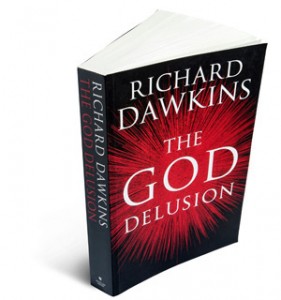 There are three kinds of “data.”
There are three kinds of “data.”
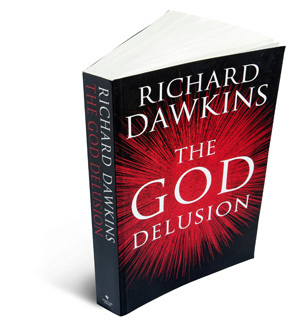













 man happiness.”5
man happiness.”5 George Washington, Benjamin Rush, John Dickinson, etc.), were passed on to his grandson who compiled those documents into a two-volume work published in 1825. After having studied those personal letters, the grandson described the great body of men who founded the nation in these words:
George Washington, Benjamin Rush, John Dickinson, etc.), were passed on to his grandson who compiled those documents into a two-volume work published in 1825. After having studied those personal letters, the grandson described the great body of men who founded the nation in these words:













You must be logged in to post a comment.